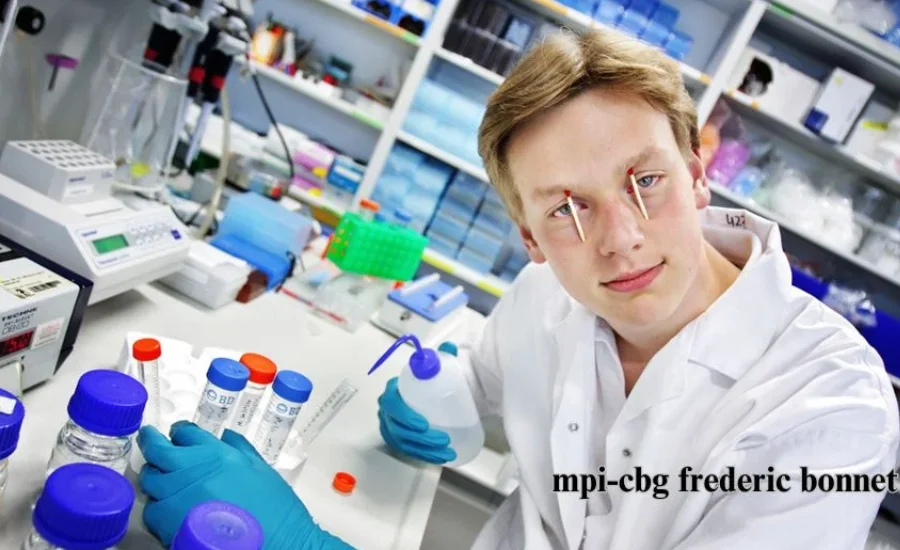Frederic Bonnet at MPI-CBG, the renowned Max Planck Institute of Molecular Cell Biology and Genetics, is known for its pioneering research in the fields of cellular biology and genetics. Located in Dresden, Germany, the institute draws elite researchers from across the globe, creating a collaborative space that encourages cutting-edge scientific discovery.
Frederic Bonnet, a prominent scientist at Mpi-cbg, has made substantial progress in molecular biology. His research, which primarily focuses on complex cellular processes and genetic structures, aligns well with the institute’s mission of addressing some of the most complex biological challenges.
At MPI-CBG, Frederic Bonnet and his team’s collaborative efforts are instrumental in enhancing our comprehension of science and medicine. Their work not only expands academic understanding but also drives technological progress, underscoring the institute’s central role in molding contemporary research and its applications across diverse disciplines. With their dedication to excellence, MPI-CBG remains a significant participant in the development of biological sciences.
The Origins of Mpi-cbg frederic bonnet
The Max Planck Institute of Molecular Cell Biology and Genetics (MPI-CBG) was founded by the Max Planck Society in 1998 with the aim of furthering the fields of molecular cell biology and genetics. The institute, situated in Dresden, Germany, rapidly evolved into a hub for scientific innovation and collaboration. It was specifically designed to draw in top experts in these disciplines.
Not long after its establishment, MPI-CBG welcomed Frederic Bonnet into its team. Bonnet quickly became a key member of the institute’s growing research group. His significant contributions have been crucial in propelling the institute’s swift progress and overall success. Bonnet’s work epitomizes MPI-CBG’s mission of addressing complex biological problems while fostering an environment of innovation and research excellence.
The Research Landscape at MPI-CBG
Mpi-cbg frederic bonnet impactful contributions, it’s important to recognize the dynamic environment that supports his work. The Max Planck Institute of Molecular Cell Biology and Genetics (MPI-CBG), based in Dresden, Germany, is renowned as a leading research hub in molecular biology. With a strong emphasis on innovative and interdisciplinary methods, MPI-CBG investigates the molecular mechanisms that govern cell and tissue organization. This attracts a diverse array of researchers from around the globe, all united in their quest to unravel the complexities of cellular function and gene expression.
As a part of the esteemed Max Planck Society, MPI-CBG carries a rich scientific legacy, being linked with more than 30 Nobel Prizes. Furnished with cutting-edge facilities, the institute stands at the vanguard of progress in biotechnology, molecular biology, and genetics. Within this respected setting, Frederic Bonnet of MPI-CBG emerges as a crucial figure, spearheading research that impacts a broad spectrum of fields, such as cancer therapy, synthetic biology, and developmental genetics. His work not only pushes the frontiers of scientific knowledge but also holds substantial implications for practical applications, emphasizing the vital role of MPI-CBG in modern research.
Mpi-cbg frederic bonnet Academic Journey

Frederic Bonnet’s rise in the field of molecular biology at Mpi-cbg is rooted in a strong academic foundation. He obtained his education at renowned institutions, specializing in molecular biology and genetics. This intense training armed him with the necessary knowledge and skills to investigate the complex molecular processes that govern cellular behavior.
At the beginning of his scholarly journey, Bonnet developed a strong fascination with the processes that control cell differentiation, growth, and gene expression. His studies explored how cells interact and adapt, especially during key developmental stages and in relation to diseases like cancer. This fundamental research laid the groundwork for his subsequent pursuits in cutting-edge fields such as synthetic biology and regenerative medicine, greatly enriching our knowledge of cell dynamics and potential treatment applications.
Mission of Mpi-cbg frederic bonnet
The Max Planck Institute of Molecular Cell Biology and Genetics (MPI-CBG) is committed to discovering the core mechanisms that drive cellular and genetic processes. It seeks to reveal the basic principles of life by studying cell growth, division, and interaction. This crucial focus opens the door for advancements in medicine and biotechnology, making the institute a worldwide frontrunner in the fields of cellular research and genetics.
Frederic Bonnet of MPI-CBG substantially contributes to their mission through his research on cellular functions and genetic mutations. His work resolves key issues in modern biology, thereby enhancing the institute’s pledge to broaden scientific comprehension. Bonnet’s investigation into these intricate matters not only deepens our grasp on cellular behavior but also aligns with MPI-CBG’s goal of encouraging innovation and breakthroughs in life sciences.
Insights into Cell Differentiation and Gene Expression
Frederic Bonnet’s research primarily centers on the complex mechanisms of cell differentiation and gene expression. His studies have illuminated the process of cells transitioning between various states, delving into the molecular controls that dictate these changes and the significance of genetic regulation in this intricate process. Bonnet’s examination of the intricate gene expression patterns that affect cellular behavior is creating new pathways for managing cellular transformations. This is especially crucial in the field of cancer biology, where uncontrolled cell growth can result in the formation of tumors.
Bonnet’s work in this area has greatly improved our knowledge of how cancer works. His investigation into the way different gene expression profiles can result in various cell responses has provided important understanding into the growth of cancer cells. His research not only deepens our understanding of how tumors grow, but also proposes possible methods to reprogram these cells to reduce their aggressive nature. Through his research, Bonnet is contributing to the foundation for new therapeutic methods in treating cancer.
Frederic Bonnet: A Leader in Molecular Biology
Frederic Bonnet of MPI-CBG has become a notable figure in the molecular biology arena. His interest in molecular mechanisms has guided his scholarly and professional path. Before joining MPI-CBG, Bonnet had already made substantial contributions to cell division research, especially in understanding the connection between these processes and disease development like cancer.
Bonnet is actively engaged in collaborations with other respected scientists at MPI-CBG, contributing to a dynamic research environment. Aside from his own research, he is passionately committed to mentoring up-and-coming researchers, helping them shape their own scientific journeys. His participation in several interdisciplinary projects not only expands the frontiers of scientific understanding, but also nurtures the future crop of scientists. Bonnet’s contributions strengthen the institute’s enduring impact in the field, solidifying a lasting legacy of inventiveness and discovery.
Advancements in Developmental Biology
Frederic Bonnet’s research at Mpi-cbg has greatly influenced the field of developmental biology, especially with his studies into genetic mutations impacting cellular growth. His research has uncovered how certain mutations can result in various developmental disorders, offering scientists new insights into congenital diseases. This fundamental research is vital in creating therapeutic approaches intended to rectify these genetic abnormalities before they develop into diseases.
Working alongside interdisciplinary research teams, Bonnet has spearheaded studies exploring the links between cellular structures and genetic disorders. This joint research is already laying the groundwork for revolutionary treatments aimed at conditions related to abnormal gene expressions during development. Bonnet’s work is not just enhancing our knowledge of developmental biology, but also unveiling new paths for therapeutic intervention. This underscores the potential for enhancing patient outcomes in genetic disorders.
Investigating Cellular Mechanisms at MPI-CBG

Frederic Bonnet conducts research at the Max Planck Institute of Molecular Cell Biology and Genetics (MPI-CBG), specifically MPI-CBG. His work dives into the intricate cellular mechanisms that uphold life. He zeroes in on the way genetic directives steer cellular functions and scrutinizes the consequences of mistakes within these directives, especially in relation to serious illnesses such as cancer.
Besides his research on genetic instructions, Bonnet also explores cellular signaling pathways—vital networks that control cell behavior. His studies have unveiled critical knowledge about cell growth, division, and reaction to external stimuli. This knowledge is key in distinguishing normal cellular activities from those affected by disease. Bonnet’s work is invaluable in pushing forward medical research, providing potential avenues for creating targeted treatments in the future.
Pioneering Synthetic Biology Research
Frederic Bonnet of Mpi-cbg has redirected his attention to synthetic biology, a groundbreaking discipline that combines biology with engineering principles. His research primarily involves creating new biological components that facilitate cell reprogramming. By creating these synthetic biological systems, Bonnet is opening up thrilling opportunities in the field of biotechnology. This is especially true for medical applications, where reprogrammed cells could have a significant impact on disease treatment.
Bonnet’s work holds significant promise, particularly in the field of regenerative medicine where engineered cells could be used to restore or substitute damaged tissues. For instance, these reprogrammed cells could be used to regenerate heart tissue after a heart attack or assist in healing chronic wounds that are difficult to treat. The progress Bonnet has made in synthetic biology could revolutionize healthcare practices, providing innovative solutions to persistent medical problems.
Groundbreaking Contributions to Molecular Biology
Frederic Bonnet of Mpi-cbg has made considerable progress in the field of molecular biology, especially in his groundbreaking research on cell division. His studies have revealed essential understanding of cell behavior, thereby improving our knowledge of how diseases like cancer begin and develop at the cellular level.
Besides his work on cell division, Bonnet’s research into genetic mutations has also had a significant impact. He has identified certain genetic targets that could be useful for therapeutic intervention, creating potential new treatment options for genetic diseases and cancer. Consequently, Bonnet’s prominence in molecular biology is continually expanding, advancing scientific knowledge and potential medical breakthroughs.
Mpi-cbg frederic bonnet Impact on Molecular Biology
Frederic Bonnet’s research importance is underscored by his numerous publications in esteemed scientific journals. His contributions have drawn significant recognition and citation from fellow researchers, underscoring his crucial role in propelling the molecular biology and genetics fields forward.
Gene Regulation and Cellular Communication: One of Bonnet’s key publications addresses the intricate molecular interactions that govern gene regulation and cellular responses. In this landmark study, he and his team elucidated how cells communicate through complex signaling pathways, significantly influencing gene expression and overall cellular behavior. This research has expanded our understanding of how cellular environments affect genetic activity, with critical implications for developmental biology and therapeutic approaches to various diseases.
Proteins and Cell Differentiation: Another notable contribution from Bonnet investigates the essential role of proteins in regulating cell differentiation during embryonic development. This study has provided vital insights into the molecular mechanisms that orchestrate tissue and organ development, paving the way for new research avenues into congenital disorders and potential therapeutic strategies.
Innovations in Synthetic Biology: In his latest work, Bonnet has ventured into the realm of synthetic biology, examining how engineered cells can be reprogrammed for medical applications. This pioneering research showcases the potential of bioengineered solutions in disease treatment, offering a glimpse into the future of personalized medicine. Bonnet’s innovative approaches in synthetic biology promise to transform our understanding of healthcare and open new doors for therapeutic interventions.
The Role of Cell Biology at MPI-CBG

At the Max Planck Institute of Molecular Cell Biology and Genetics (MPI-CBG), cell biology is a fundamental part of their research approach. Researchers at the institute explore the basic processes of cellular life, including cell growth, division, and differentiation. The pioneering findings from their research are crucial in improving our comprehension of human development and preventing diseases.
Frederic Bonnet of MPI-CBG, leveraging his vast expertise, plays a crucial role in propelling research forward at MPI-CBG. His research primarily delves into the complex functions of cells under normal and pathological circumstances. Particularly, his exploration of signaling pathways and cell division is vital to the institute’s objective of deciphering the intricacies of life at the molecular scale. Bonnet’s work significantly enhances the scientific community’s comprehension of cellular dynamics and opens up avenues for new therapeutic strategies.
State-of-the-Art Research at MPI-CBG
The pioneering research of Frederic Bonnet is facilitated by the state-of-the-art technologies at the Max Planck Institute of Molecular Cell Biology and Genetics (MPI-CBG). Such sophisticated tools enable researchers to observe cellular processes with exceptional accuracy, thereby allowing them to see molecular interactions in real-time.
The use of super-resolution microscopy, a key innovation at MPI-CBG, allows scientists to view cells and their components with unprecedented detail. This imaging technology offers crucial understanding of cellular behavior, making it possible to monitor molecular changes in real-time. For Bonnet and his team, these capabilities are essential for visualizing complex processes, including gene regulation and applications in synthetic biology.
MPI-CBG not only utilizes advancements in imaging but also employs sophisticated computational biology techniques to process and analyze extensive data from their experiments. The use of bioinformatics tools allows researchers to model genetic networks and predict cellular responses to different stimuli. This analytical method further enhances their comprehension of the biological processes they study, ultimately amplifying the significance of their research.
MPI-CBG: A Leader in Genetics Research
The Max Planck Institute of Molecular Cell Biology and Genetics (MPI-CBG) has established itself as a leading global authority in genetics research. The institute’s scientists study the complex relationships between genes and cellular functions, as well as how genetic mutations can cause different diseases. Using cutting-edge technologies like CRISPR, researchers at MPI-CBG are making revolutionary discoveries in genetics that could greatly improve human health.
Frederic Bonnet of Mpi-cbg has been instrumental in advancements through his cutting-edge research on genetic mutations. His work has illuminated the ways in which these mutations affect cell functions, providing vital understanding that leads to new medical treatments. Bonnet’s discoveries also support the rapidly growing field of personalized medicine, where therapies are customized according to individual genetic profiles, optimising patient outcomes.
Interdisciplinary Collaboration at Mpi-cbg frederic bonnet
Frederic Bonnet’s accomplishments have been significantly influenced by the strong focus on interdisciplinary collaboration at the Max Planck Institute of Molecular Cell Biology and Genetics. At MPI-CBG, experts from various disciplines come together to address complex issues, using their unique expertise to fuel groundbreaking discoveries.
The institute cultivates an environment where teamwork is not only promoted, but is also a key element of the research process. This collaborative spirit is essential in addressing the most urgent issues in molecular biology and genetics, placing MPI-CBG at the forefront of scientific discovery. This kind of setting enables researchers like Bonnet to challenge the limits of understanding and make significant progress in their respective fields.
Groundbreaking Discoveries at MPI-CBG
The Max Planck Institute of Molecular Cell Biology and Genetics (MPI-CBG) has made numerous revolutionary discoveries over the years. Novel cellular communication pathways have been revealed and advanced imaging techniques have been developed by the institute’s researchers. These advancements have considerable impact on areas like medicine, agriculture, and biotechnology.
Frederic Bonnet of Mpi-cbg has been a pivotal figure in numerous key discoveries. His groundbreaking research on cell division and genetic mutations has provided crucial knowledge that could revolutionize the treatment of genetic disorders and cancer. His findings not only deepen our comprehension of cellular processes but also lay the foundation for innovative therapies that could enhance health outcomes around the globe.
Collaborative Research at MPI-CBG
The Max Planck Institute of Molecular Cell Biology and Genetics (MPI-CBG) places collaboration at the core of its research model. By partnering with top research organizations across the globe, they empower scientists to address some of today’s most urgent biological inquiries. This cooperative approach has resulted in numerous substantial scientific advancements.
Mpi-cbg frederic bonnet Role in International Collaborations
Frederic Bonnet from Mpi-cbg is deeply involved in various collaborative projects, often partnering with international researchers to further his studies on cellular processes and genetic mutations. These collaborations not only enhance his research, but also contribute to pushing the limits of molecular biology, resulting in significant progress in the field.
Influential Publications
Bonnet, over his career, has written numerous research papers that have greatly influenced the field of molecular biology. His groundbreaking work on cellular processes and genetic mutations have been widely referenced, sparking further research within the scientific community. Importantly, his most impactful work relates to cell division and how genetic mutations can result in disease, which continue to affect current research endeavors.
Recognitions and Awards
Bonnet’s pioneering work in cellular biology and genetics has earned him multiple esteemed awards, embodying the scientific community’s acknowledgment of his contributions. These honors not only shine a light on his personal accomplishments but also emphasize the overall success of MPI-CBG. The institute’s dedication to promoting cooperation and pushing forward the boundaries of science has empowered Bonnet and his team to produce exceptional results, boosting MPI-CBG’s global standing.
The Future of Biotechnology with Frederic Bonnet

As the realms of molecular biology and genetics progress, Frederic Bonnet’s studies are poised to largely shape the future of biotechnology. His groundbreaking work in synthetic biology and comprehension of cellular behavior is establishing the foundation for novel therapies and technologies, which could potentially transform medicine and improve human health.
Future projects at MPI-CBG are set to delve further into areas like synthetic biology, regenerative medicine, and genetic disorder treatments. As new technologies and methodologies continuously arise, Bonnet and his team are optimally placed to stay at the cutting edge of scientific innovation. They are primed to lead significant breakthroughs that could potentially revolutionize our understanding of healthcare.
Also Read: 6530-20-1 metabolites
Final Words
The Dresden, Germany-based Max Planck Institute of Molecular Cell Biology and Genetics (MPI-CBG) is globally recognized for its innovative research in cellular biology and genetics. Frederic Bonnet, a prominent figure at MPI-CBG, has notably contributed to molecular biology with his focus on cellular processes, genetic mutations, and cancer research. His significant work aids in advancing our comprehension of gene expression, cell differentiation, and synthetic biology.
The interdisciplinary and collaborative environment at MPI-CBG fosters ground-breaking discoveries, establishing it as a frontrunner in the fields of biotechnology and genetics. The innovative research of Bonnet in synthetic biology and regenerative medicine is laden with immense potential for future medical breakthroughs, particularly in the areas of personalized medicine and disease treatment. Bonnet and MPI-CBG’s continuous efforts are molding the future of molecular biology and biotechnology, propelling significant advancements that boost global scientific knowledge and healthcare practices.
Keep the knowledge flowing—check out more at Alevemente.
MPI-CBG Frederic Bonnet: 6 Powerful Advances in Cancer Treatment and Research – Alevemente




